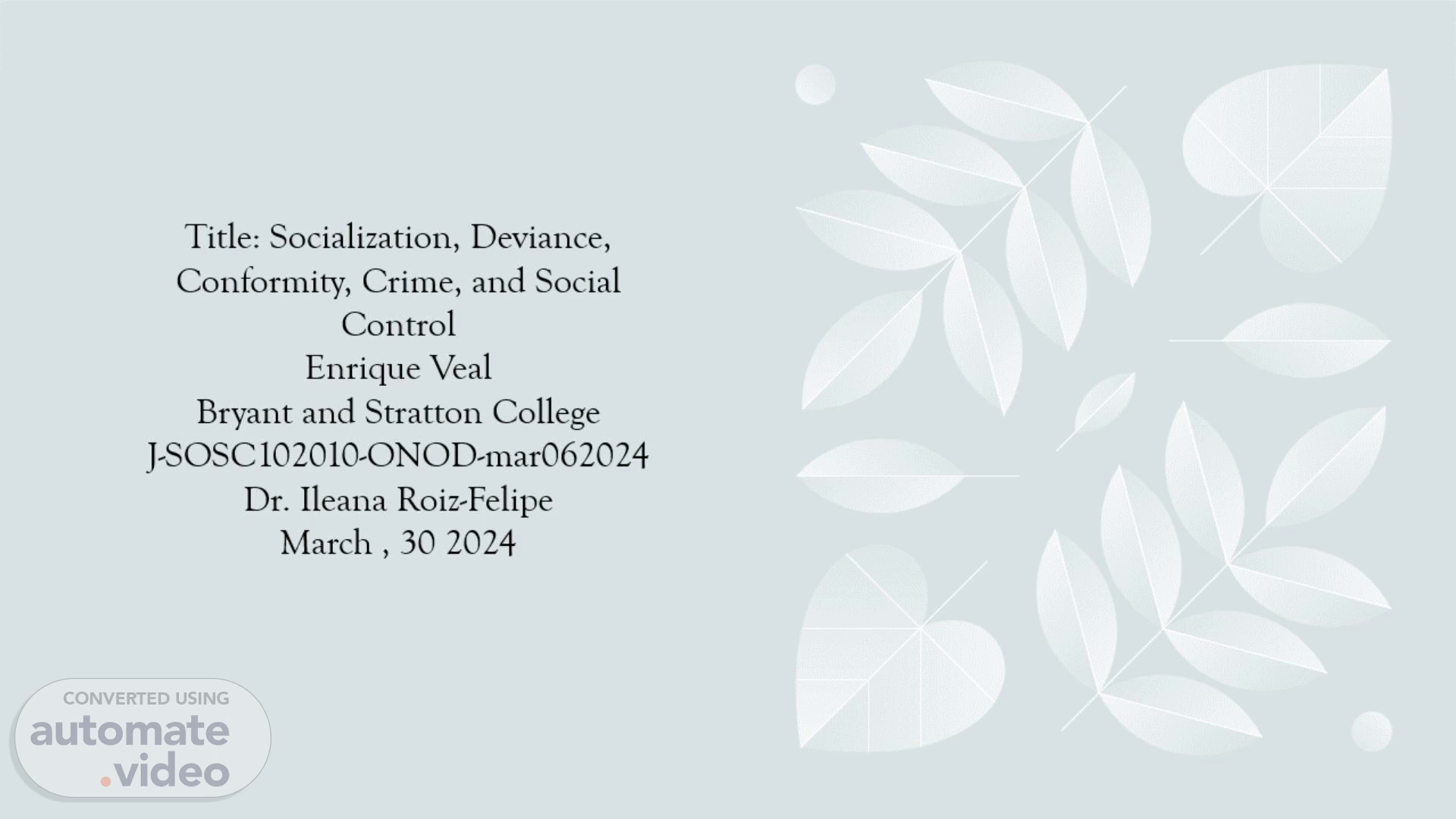
Page 1 (0s)
Title: Socialization, Deviance, Conformity, Crime, and Social Control Enrique Veal Bryant and Stratton College J-SOSC102010-ONOD-mar062024 Dr. Ileana Roiz-Felipe March , 30 2024.
Page 2 (10s)
Introduction. - Sociology studies the relationship between society and individuals, exploring how social factors influence behavior and interactions within various contexts, including the workplace. Socialization, the process through which individuals learn and internalize the values, norms, and behaviors of a society, significantly impacts how individuals interact within the workplace. Conflicts in the workplace often arise due to differing values, beliefs, and norms among employees, leading to misunderstandings and challenges in communication and collaboration..
Page 3 (34s)
Family - Families play a crucial role in shaping the values, beliefs, and norms of individuals, which in turn influence their behavior and interactions in the workplace. - Cultural understanding is heavily influenced by one's family background, as traditions, rituals, and practices within the family unit contribute to an individual's worldview. - Family traditions and expectations serve as a form of social control, guiding individuals' behavior and decision-making both within and outside of the workplace..
Page 4 (57s)
School. [image] Smiling teacher in classroom. - Schools not only educate individuals academically but also play a significant role in shaping their behavior and social norms, which can impact how they interact in a workplace setting. - Power dynamics within educational systems can influence how individuals perceive authority and hierarchy, reflecting on their behavior within organizational structures in the future. - Deviant behavior in schools is often addressed through disciplinary actions, setting a precedent for how deviance is handled in other social contexts like the workplace..
Page 5 (1m 20s)
Media. Video camera on stand recording man presenting and holding laptop with one hand.
Page 6 (1m 54s)
Peer Groups. People sitting in group. - Peer pressure is a significant influencer that can shape behavior, attitudes, and decision-making processes among individuals. The desire to conform to group norms and expectations can lead individuals to engage in behaviors they might not otherwise consider. - Group dynamics within peer groups play a crucial role in influencing individual choices. The interactions, values, and norms within a peer group can impact how individuals behave and make decisions, including those related to the workplace. - Social control operates within peer groups through the establishment of group expectations and norms. Individuals may adjust their behavior to align with the group's standards to avoid social sanctions or gain acceptance and approval from their peers..
Page 7 (2m 25s)
Workplace. - The organizational culture of a workplace significantly influences employee behavior, attitudes, and interactions. Workplace culture encompasses shared values, beliefs, and norms that guide employees' actions and decisions within the organizational context. - Power structures within the workplace, including hierarchies and reporting relationships, can impact employee dynamics by influencing communication patterns, decision-making processes, and the distribution of resources and responsibilities. - Deviant behavior in the workplace, such as violations of company policies or norms, is typically addressed through HR policies and procedures. These policies establish guidelines for acceptable behavior, outline consequences for infractions, and maintain organizational order and cohesion..
Page 8 (2m 55s)
Religion. - Religion plays a significant role in shaping moral values and ethics for individuals, providing guidelines for behavior and decision-making based on religious teachings and beliefs. These values often influence how individuals approach ethical dilemmas in personal and professional settings. - Cultural norms are often reinforced through faith practices and rituals within religious communities. These norms can dictate social behavior, interactions, and expectations, impacting how individuals engage with others both within and outside of their religious community. - Social control mechanisms operate within religious communities to regulate behavior and maintain adherence to religious teachings and traditions. This can include social sanctions, communal expectations, and religious authorities ensuring conformity to established norms..
Page 9 (3m 27s)
Methods of Socialization and Social Control. [image] Students gathered in amphitheater.
Page 10 (3m 58s)
Deviance in Personal and Workplace Lives. Frustrated old businessman.
Page 11 (4m 33s)
Addressing Social Inequalities and Promoting Social Change.